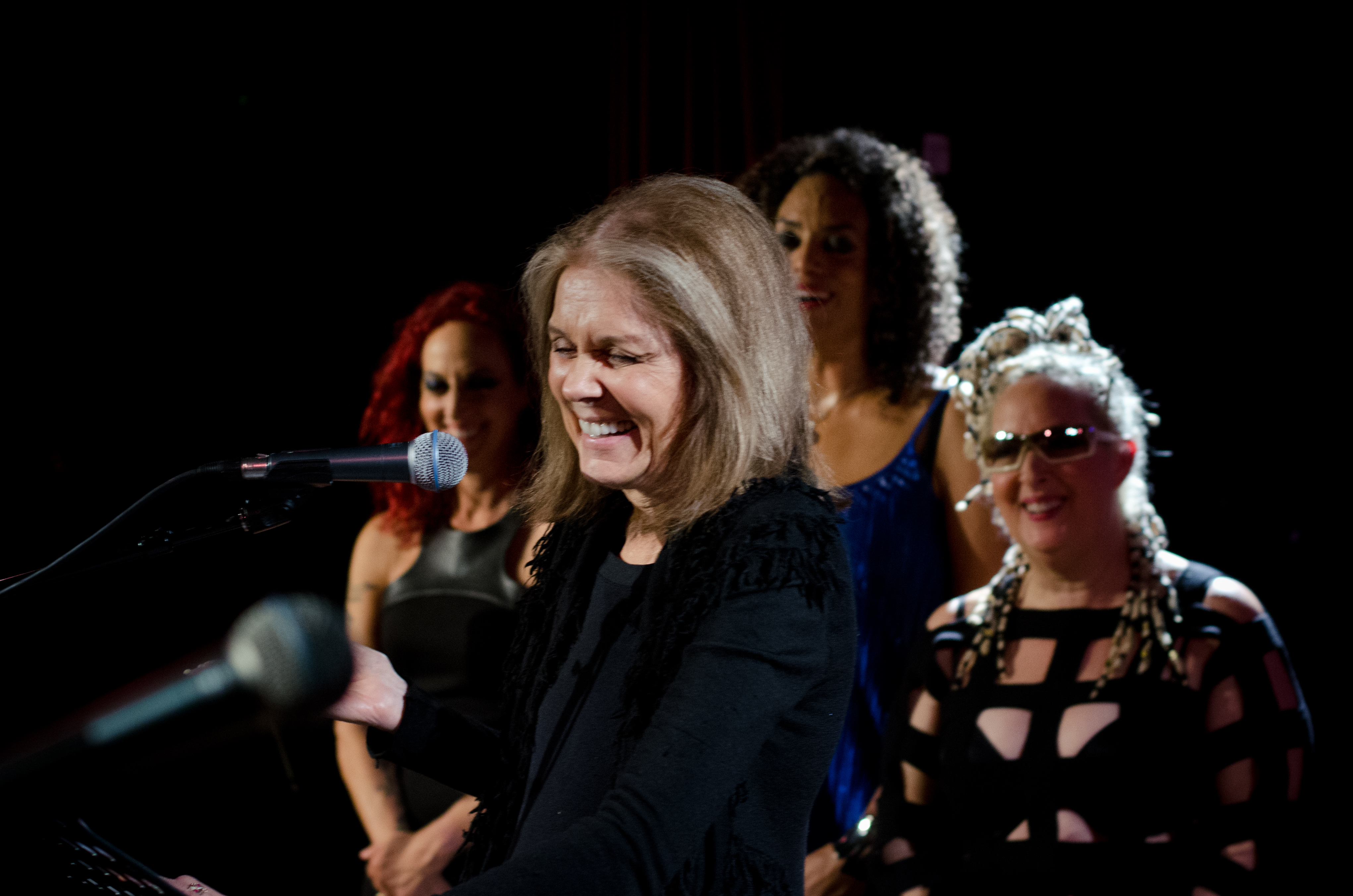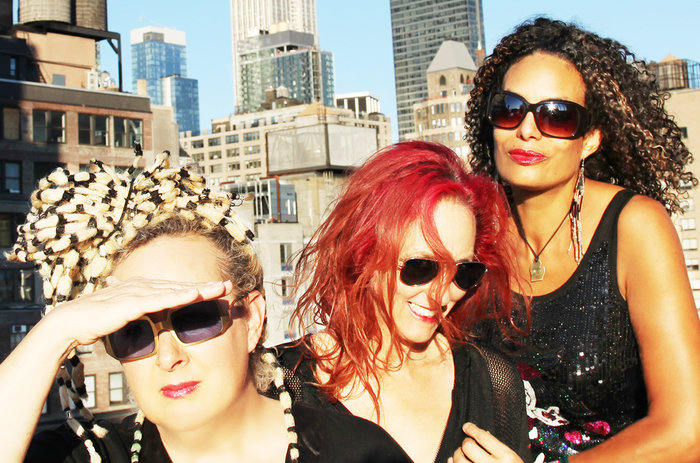Despite the abundance of artists proudly identifying as feminists these says, from Rhapsody to Princess Nokia to Cardi B, there was a time back in the day when feminism was not seen as so marketable in the music industry. However, there was a band who successfully incorporated their feminism into their music before doing so was cool.
Way back in 1986, two Jewish sisters (Amy and Elizabeth Ziff) and a dazzling Black woman (Alyson Palmer) created a band full of chutzpah, funky harmonies, and garage band beats called BETTY. If you haven’t heard their name, you’ve most likely heard their music in hit television series like The L Word (they did both the soundtrack and theme song) and Weeds. Although BETTY is often referred to as “alternative” music, the band’s feminism has always been wonderfully intersectional, mixing different genres such as funk, hip hop, and even D.C. go go along with their Jewish, Black, and queer identities.
As we welcome The L Word reboot and think fondly of the original music, I had the opportunity to interview all three members of BETTY about their upcoming holiday tour in the Northeast and how they still carry their DIY spirit and feminist attitude today.
This interview has been lightly edited and condensed.
How has Judaism influenced your music?
Elizabeth: When we tour around the world, we’ve noticed that everyone is really stoked when we matter of factly mention that BETTY is Jewish and Black women who’ve been working together for a long time. I think everyone really appreciates it, especially now that we perform all around the world and there’s a lot of deep rooted anti-Semitism that seems to make Jews uncomfortable to recognize their Jewishness.
As a Jew myself, I love the episode of The L Word when you were guest starring and are seen wearing a mega-sized Jewish star! What was the importance of representation like that for you?
Elizabeth: I was wearing the Jewish star. It’s a giant one that I bought on Canal Street about 15 years ago. It’s a hip hop bling version. I lost it, damnit. Hundreds of people actually wrote to me in appreciation for wearing that Jewish star. I’m proud of being Jewish and just wanted to represent.
Amy and Elizabeth, what was your Jewish upbringing like?
Amy: I mean, we’re very outspoken about being Jewish because our dad was in the military. We traveled all over the place, including Northern Virginia, which at the time had zero Jews. So, we never went to synagogue. It was just more cultural. However, being Jewish is very much who we are. Our humor, our place in the world, our identification as feminist, are all a part of being Jewish, but it’s never been really a religious thing.
Elizabeth: I believe in the Goddess. You know what I’m saying…
Amy: I love Judaism — the way we can question and somehow find answers in Judaism. That gives me solace. It really does!
Elizabeth: And we’re Jews… so, of course, we’re funny!
Did you ever receive any backlash from the recording industry for having such a freely Jewish, queer, and Black image?
Alyson: It was more feminism that we got a backlash from. In the beginning, they wanted to tell us how to dress, give us new songwriters, and to sort of make us a “girl group.” We wanted to laugh because it just wasn’t who we were. It wasn’t the path that we decided to take, which might have hurt us, but we’re still here! Anyhow, a lot of those in the music industry aren’t here anymore.

BETTY with Gloria Steinem at their holiday show in NYC. Photo by Marnie Ann Joyce.
Not to be a fangirl, but I’m very excited that The L Word is coming back (renamed as Generation Q) on Showtime. In the past, BETTY not only made many guest appearances on the show, but also provided a lot of the soundtrack, as well as the theme song. Will BETTY be heavily involved with Generation Q?
Elizabeth: They might use some of our songs, but we’re not doing the music for it. We wanted to leave it open for the next “generation” to come up, because it’s the next “generation” L Word. You know what I’m saying? We’re doing a lot of other things right now, like traveling and working on a new album.
So you mentioned the next generation. So, my question for you is, do you have any favorite new artists?
Alyson: The first time I so Lizzo was in D.C. It was so life-affirming and fabulous! I’m wild for her. I’m all for the women artists who are taking life on there own terms.
Amy: I think we all agree that we appreciate and celebrate women artists who are standing up for their beliefs and also feminists who are reaching out to lots of different people and different platforms.
Elizabeth: Yeah, like being sexual, being fun, and being inclusive. We really dig Netta (the Israeli singer), Haim, and a whole crop of women who are hopefully breaking the barriers, which are put up in every single generation. It’s the same in literature. It’s the same in music. We have to rediscover the women who are working in culture because they are not celebrated.
Okay, Jew food question: falafel, shwarma, or hummus?
Amy: Hummus.
Elizabeth: Hummus. I never even had it growing up, but I finally ate it in Israel. I lived in Israel for like two years after I graduated from high school and I almost made aliyah. At the time, I couldn’t find anybody else who was gay, believe it or not.
Your band started in 1986 and is still going strong. What legacy do you hope to leave?
Amy: I would like our lasting legacy to be that when you went to a BETTY concert or when you heard our music, somehow something changed — either you were happier, more open, you met somebody, or you saw things just a little bit differently.
Elizabeth: I think our legacy is our story and how we’ve survived and thrived as DIY women in music.
Alyson: I gotta say, one of the things I’m really excited about already happened. When we started out about 1,000 years ago, they made it seem like if you did gay pride, it would end your career. We said, “We don’t care! We’re going to do gay prides!” They need to be done. We need to talk about AIDS and stuff like that. The fact is that when we did them a long time ago, we helped open the door so that other people could feel more comfortable doing them. By going against the grain and taking big steps, you can open the door wider for other people.
BETTY will be performing a holiday show in Washington D.C. on December 15. Get tickets here.
Header image by Francesca Galliani.



